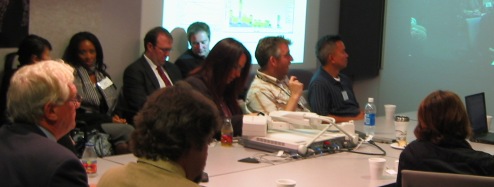
Today, October 3, TRIUMF hosted one of several Grid Fest celebrations occurring simultaneously around the world. Grid Fest celebrates the official unveiling of the Worldwide LHC Computing Grid (WLCG), which TRIUMF participates in through its ATLAS Canada Tier-1 Data Centre.
The WLCG combines the power of more than 140 computer centres, the result of collaboration between 33 countries, to analyze more than 15 million Gigabytes of data every year, which will be produced from the hundreds of millions of subatomic collisions expected inside the LHC every second. TRIUMF operates one of the 11 Tier-1 computer centres connected directly to the Tier-0 Centre at CERN. It is the only one in Canada and will be providing service to the Tier-2 centres at various universities across the country.
TRIUMF’s event was both very local and very international in nature. The focus of the first part of the morning was not just about celebrating the achievement of the WLCG, but also for congratulating and thanking those who made the Tier-1 at TRIUMF possible. Speakers from TRIUMF, Simon Fraser University, BCNET, CFI, CANARIE, and the BC Ministry of Technology, Trade, and Economic Development attended in recognition of their contributions, along with those of many others, to this historic event. Afterwards, a videoconference was held in which participants hailed from as far away as the University of Toronto, Fermilab and Brookhaven in the US, CERN, and even Rome – from there NRC President Pierre Coulombe spoke of the importance of this achievement. CERN panelists then fielded questions from the various sites, such as queries about the future applications of Grid technology, and the idea to use the Grid for information sharing. Guests also had the opportunity to tour TRIUMF’s Tier-1 Data Centre.
The WLCG represents a significant step forward for both the LHC experiments and for computer technology. “The Worldwide LHC Computing Grid is a vital pillar of the LHC project,” said Jos Engelen, chief scientific officer for the LHC project. “It is an absolute necessity for analysis of the LHC data. It is the result of a ‘silent revolution’ in large scale computing over the last five years.”
For more information, see the TRIUMF news release.
By Kaitlan Huckabone
TRIUMF's Communications Assistant
